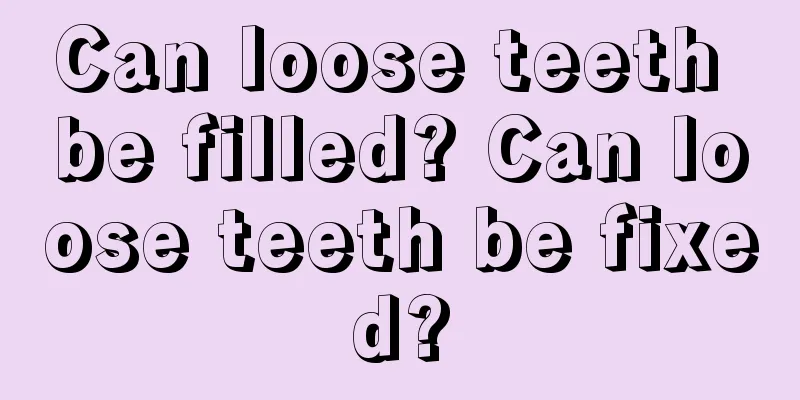Can loose teeth be filled? Can loose teeth be fixed?

|
Teeth should be strong and indestructible, but some people may have dental problems, such as loose teeth. Loose teeth include many factors, and different factors have different types of looseness. Generally, our teeth are tiny and not easy to detect. Only when lesions occur around the teeth and the amplitude of movement increases, will serious situations occur. Loose teeth are caused by many factors. Due to different causes and degrees of looseness, the treatment methods are also different. Under normal circumstances, our teeth have slight mobility, which is generally not easy to detect. Only when lesions occur around the teeth and the mobility increases, can it be discovered. Generally speaking, single-root teeth are more likely to loosen than multi-root teeth, and short roots are more likely to loosen than thick roots. Loose teeth are most common in teeth with periodontal disease. Due to the loss of supporting tissues such as the periodontal membrane and alveolar bone, the tooth roots are exposed and the teeth become loose. If the looseness is mild, it will usually return to normal through effective periodontal treatment. If the looseness is moderate, the loose teeth should be ligated and fixed together with the adjacent teeth while treating the periodontal disease to reduce the load on the loose teeth and prevent the looseness from getting worse. At this time, most loose teeth cannot be restored. If the looseness is severe, it means that the teeth are loose Ⅲ", that is, the teeth are obviously loose up and down, left and right. At this time, the method of extracting the affected teeth is often used to avoid adding unnecessary burden to the adjacent teeth. When the bite force of individual teeth is too strong or the bite relationship is abnormal, it can cause vertical absorption of the alveolar bone, widen the periodontal membrane space, and the teeth may also become loose. Generally, after the doctor adjusts the bite, the bite trauma is eliminated, the alveolar bone can repair itself, and the teeth can also return to a stable state. When teeth are subjected to acute trauma, such as external blows or biting hard objects, they may also become loose. If the tooth is slightly loose, you can take anti-inflammatory drugs (spiramycin, lincomycin, etc.). Once the inflammation subsides, the tooth will automatically return to a stable state. If the tooth is severely loose or dislocated or shifted, the tooth should be repositioned and then ligated to the adjacent teeth. Take anti-inflammatory drugs, maintain oral hygiene, and prohibit using this tooth in the short term. After 1 to 2 months, the tooth will return to normal. When periodontitis or apical periodontitis occurs acutely, manifesting as periodontal or periapical abscesses, the affected teeth will also feel floating and feel loose. Once the acute inflammation is relieved, the loose teeth will also be reduced or disappear. During the transition period between deciduous and permanent teeth, the deciduous teeth may become loose due to root absorption and are about to fall out. This is a normal physiological phenomenon and there is no need to worry. |
<<: What kind of water is best to drink after exercise
>>: How to whiten teeth with lemon
Recommend
What causes colorectal cancer?
Nowadays, colorectal cancer is a common tumor dis...
How to treat cervical cancer
At present, the incidence of cervical cancer is g...
The difference between urine routine and urine culture
Urinalysis is to check whether the content of var...
How long do people with osteosarcoma usually live?
Osteosarcoma is the most common type of malignant...
What is the difference between Cherry axis and domestic axis?
In daily life, the keyboard is one of the standar...
How to prevent liver cancer if you have hepatitis B? Do five things to prevent hepatitis B from turning into liver cancer
Long-term observations show that chronic hepatiti...
Cost of rectal cancer stents
How much does a stent cost for rectal cancer? Rec...
What does MRI check? What is MRI
As a new medical technology in recent years, the ...
How many meters of blood vessels does a person have?
We all know that there are many blood vessels in ...
How to remove the burnt smell from a burnt pot
In life, there are always some people who are not...
Why does my back always hurt?
In daily life, most people have had this experien...
What should patients with endometrial cancer eat in their daily diet? Which 20 kinds of vegetables have an inhibitory effect on tumor cells?
Patients with uterine cancer should pay attention...
Health care methods for feet
In fact, people who pay attention to health care ...
What medicine is better for sore throat caused by swallowing saliva?
The throat is a very important tissue for people....
When is the best time to sunbathe?
Since people don't know when is the best time...









